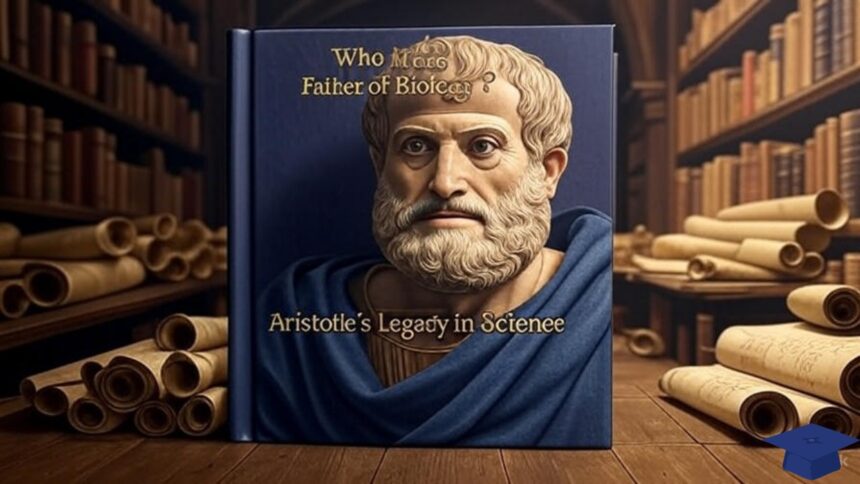Biology, the study of life and living organisms, has a history that stretches back thousands of years. While many great thinkers have shaped the field, Aristotle (384–322 BCE), the ancient Greek philosopher, is universally recognized as the Father of Biology. His groundbreaking observations, classifications, and theories about the natural world marked the beginning of biology as a systematic science, laying a foundation that continues to influence modern research.
Biography of Aristotle: The Father of Biology
- Born: 384 BCE in Stagira, Macedonia (Northern Greece)
- Education: Studied under Plato at the Academy in Athens
- Career: Tutor to Alexander the Great, founder of the Lyceum in Athens
- Contributions: Authored works on philosophy, logic, ethics, politics, and science, with biology being one of his most significant achievements
Aristotle’s fascination with living organisms, particularly during his time on the island of Lesvos, led him to study animals, plants, and natural processes with unprecedented detail. Unlike mythological explanations of life in his era, Aristotle emphasized observation and empirical reasoning.
Why is Aristotle Called the Father of Biology?
Aristotle earned this title because he was the first to:
- Systematically study and classify living organisms, grouping them by structural and functional similarities.
- Introduce early concepts of anatomy, physiology, reproduction, and embryology, which were centuries ahead of their time.
- Document marine life and terrestrial species, making detailed observations of their habitats and behavior.
- Adopt a scientific approach, replacing myth with logical explanations based on evidence.
Through these achievements, Aristotle transformed biology from a collection of scattered observations into a structured discipline.
Major Works of Aristotle in Biology
Aristotle produced over 200 works, many of which survive only in fragments. His biological writings, however, stand as some of the most comprehensive studies of the ancient world.
1. Historia Animalium (History of Animals)
- Described the anatomy, behavior, and habitats of animals.
- Classified animals into those with blood (vertebrates) and without blood (invertebrates).
- Provided detailed accounts of marine organisms like mollusks, fish, and crustaceans.
2. De Partibus Animalium (Parts of Animals)
- Examined anatomy and physiology.
- Explained structural similarities and differences among species.
- Laid early groundwork for the concept of homology and analogy.
3. De Generatione Animalium (Generation of Animals)
- Focused on reproduction, heredity, and embryonic development.
- Documented chick embryo development and theorized inheritance of traits.
4. Other Works
- Writings on animal motion, respiration, and longevity.
- Plant-related works are lost, but his student, Theophrastus, carried forward this research, becoming the Father of Botany.
Aristotle’s Key Contributions to Biology
- Animal Classification – Divided animals into vertebrates and invertebrates, an early form of taxonomy.
- Marine Biology – Identified whales and dolphins as mammals, not fish.
- Embryology – Studied chick embryos, noting the heart forms first.
- Comparative Anatomy – Conducted dissections to understand organ function and structure.
- Scientific Method – Advocated observation, systematic data collection, and logical reasoning.
- Philosophical Framework – Introduced concepts like the “vegetative, sensitive, and rational soul” to explain life processes.
Father of Biology and Related Fields
While Aristotle is the Father of Biology, other pioneers contributed to specific branches:
- Theophrastus – Father of Botany
- Antonie van Leeuwenhoek – Father of Microbiology
- Gregor Mendel – Father of Genetics
- Herophilus – Father of Anatomy
- Charles Darwin – Father of Modern Biology
- J.C. Bose – Father of Biology in India
Aristotle’s influence, however, remains central, as many of these fields trace their roots to his methods of observation and classification.
Influence and Legacy
- Aristotle’s works survived through Arabic translations and later influenced medieval European science.
- His theories, though not always accurate, emphasized the importance of studying life scientifically.
- Concepts such as taxonomy, embryology, and comparative anatomy continue to echo his pioneering ideas.
- His name is honored worldwide, with landmarks such as the Aristotle Mountains in Antarctica and the Aristoteles crater on the Moon.









